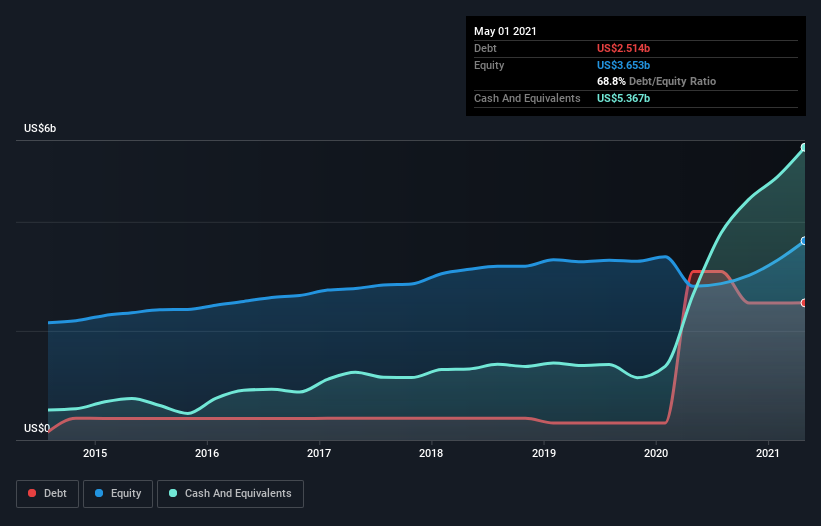Ross Stores (NASDAQ:ROST) Seems To Use Debt Rather Sparingly
Some say volatility, rather than debt, is the best way to think about risk as an investor, but Warren Buffett famously said that 'Volatility is far from synonymous with risk.' So it might be obvious that you need to consider debt, when you think about how risky any given stock is, because too much debt can sink a company. We note that Ross Stores, Inc. (NASDAQ:ROST) does have debt on its balance sheet. But the more important question is: how much risk is that debt creating?
When Is Debt A Problem?
Generally speaking, debt only becomes a real problem when a company can't easily pay it off, either by raising capital or with its own cash flow. In the worst case scenario, a company can go bankrupt if it cannot pay its creditors. While that is not too common, we often do see indebted companies permanently diluting shareholders because lenders force them to raise capital at a distressed price. Of course, plenty of companies use debt to fund growth, without any negative consequences. When we think about a company's use of debt, we first look at cash and debt together.
Check out our latest analysis for Ross Stores
What Is Ross Stores's Debt?
You can click the graphic below for the historical numbers, but it shows that Ross Stores had US$2.51b of debt in May 2021, down from US$3.09b, one year before. However, it does have US$5.37b in cash offsetting this, leading to net cash of US$2.85b.
A Look At Ross Stores' Liabilities
We can see from the most recent balance sheet that Ross Stores had liabilities of US$4.32b falling due within a year, and liabilities of US$5.42b due beyond that. On the other hand, it had cash of US$5.37b and US$167.1m worth of receivables due within a year. So its liabilities total US$4.21b more than the combination of its cash and short-term receivables.
Since publicly traded Ross Stores shares are worth a very impressive total of US$43.5b, it seems unlikely that this level of liabilities would be a major threat. However, we do think it is worth keeping an eye on its balance sheet strength, as it may change over time. While it does have liabilities worth noting, Ross Stores also has more cash than debt, so we're pretty confident it can manage its debt safely.
In addition to that, we're happy to report that Ross Stores has boosted its EBIT by 33%, thus reducing the spectre of future debt repayments. The balance sheet is clearly the area to focus on when you are analysing debt. But it is future earnings, more than anything, that will determine Ross Stores's ability to maintain a healthy balance sheet going forward. So if you want to see what the professionals think, you might find this free report on analyst profit forecasts to be interesting.
But our final consideration is also important, because a company cannot pay debt with paper profits; it needs cold hard cash. While Ross Stores has net cash on its balance sheet, it's still worth taking a look at its ability to convert earnings before interest and tax (EBIT) to free cash flow, to help us understand how quickly it is building (or eroding) that cash balance. Happily for any shareholders, Ross Stores actually produced more free cash flow than EBIT over the last three years. That sort of strong cash conversion gets us as excited as the crowd when the beat drops at a Daft Punk concert.
Summing up
We could understand if investors are concerned about Ross Stores's liabilities, but we can be reassured by the fact it has has net cash of US$2.85b. The cherry on top was that in converted 113% of that EBIT to free cash flow, bringing in US$3.7b. So we don't think Ross Stores's use of debt is risky. There's no doubt that we learn most about debt from the balance sheet. But ultimately, every company can contain risks that exist outside of the balance sheet. To that end, you should be aware of the 2 warning signs we've spotted with Ross Stores .
If, after all that, you're more interested in a fast growing company with a rock-solid balance sheet, then check out our list of net cash growth stocks without delay.
This article by Simply Wall St is general in nature. It does not constitute a recommendation to buy or sell any stock, and does not take account of your objectives, or your financial situation. We aim to bring you long-term focused analysis driven by fundamental data. Note that our analysis may not factor in the latest price-sensitive company announcements or qualitative material. Simply Wall St has no position in any stocks mentioned.
Have feedback on this article? Concerned about the content? Get in touch with us directly. Alternatively, email editorial-team (at) simplywallst.com.

